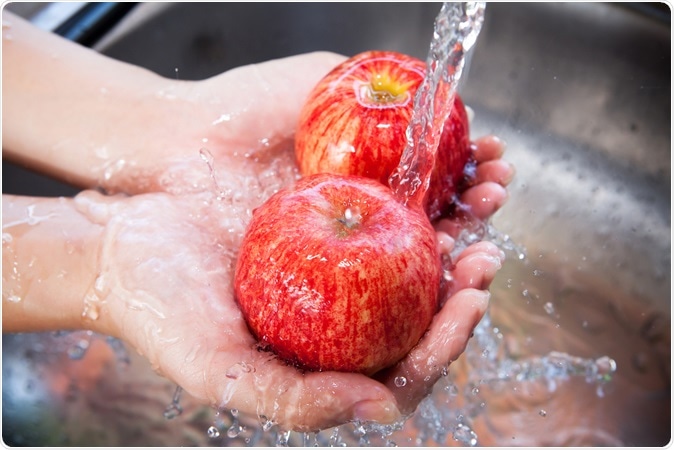A new study has revealed that washing an apple under running water is not enough to remove the pesticides that are sprayed over its skin. A baking soda solution dip for 12 to 15 minutes could be the answer to removal of harmful chemicals from the fruits, find researchers from the University of Massachusetts, Amherst.

Image Credit: Monofaction / Shutterstock
Pesticides are usually sprayed over fruits and vegetables to keep the insects and pests away and protect the produce. However these are harmful when consumed say experts damaging several organs and affecting growing babies and children.
The new study entitled “Effectiveness of Commercial and Homemade Washing Agents in Removing Pesticide Residues on and in Apples”, is reported in the Journal of Agricultural and Food Chemistry.
For this study the researchers compared different ways of washing organic Gala apples before consumption.
Three methods they compared include;
- Bleach solution that is commonly used by farmers after harvesting
- Baking soda solution
- Plain tap water
Lili He, a food scientist at the University of Massachusetts explained that this study wanted to assess if the bleach washing at the factory level was enough to remove the pesticides.
The team had soaked the fruits for a few minutes to a full day in insecticides, fungicides and pesticides and assessed the differences in these three cleaning solutions. Then they went on to measure the amount of chemicals that were still present on the surface of the fruit as well as within the fruit.
Two pesticide residues were primarily checked upon including phosmet and thiabendazole. Phosmet is an insecticide and thiabendazole acts as a fungicide that can prevent fungal infection of the produce. Thiabendazole is used as a de-worming agent in humans.
Results revealed that the baking soda solution worked best in removal of the pesticides from the surface of the fruits.
The composition of the baking solution used according to Dr. He was a teaspoon of baking soda into two cups of water. Being soaked in baking soda solution for 12 to 15 minutes ensured that the chemicals were almost completely removed from the surface.
Around 80 percent of the thiabendazole residues and 95 percent of phosmet residues were removed from the fruit surfaces.
However 20 percent of the fungicides and 4 percent of the insecticides did manage to penetrate the skin of the apples and enter the fruit. These could not be removed by washing and soaking in any solution.
Researchers write that baking soda might be effective here but may not be effective on all fruits. Peeling the fruits might be a better option to remove as much pesticides and harmful chemicals present on the skin as possible before consumption.
According to FDA recommendation, all fruits should be washed under running water. Fruits that are to be peeled and eaten also need to be washed thoroughly. Scrubbing with a brush is recommended for firm fruits such as apples, cucumbers etc. before they are dried with a clean towel.
Organic foods are alternative options say experts. However these are more expensive and the fact that they are pesticide or chemical free is not certain.